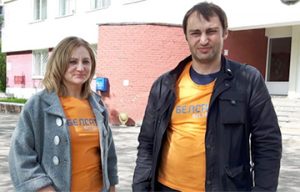Index relies entirely on the support of donors and readers to do its work.
Help us keep amplifying censored voices today.
[vc_row][vc_column][vc_column_text]
[/vc_column_text][/vc_column][/vc_row][vc_row][vc_column][vc_row_inner][vc_column_inner][vc_custom_heading text=”4 Incidents” use_theme_fonts=”yes”][vc_column_text]
21 August 2019 – Journalist Nasta Zakharevich, who has been reporting on the construction of a controversial battery factory located in Brest, received insulting messages and a veiled threat from an account on VKontakte social network.
The VKontakte account is known for often leaving harsh and rude comments under posts authored by opponents of the plant. Earlier an individual with the same name and surname as the VKontakte profile that made the comments had filed a complaint with the police against ecological activist Dzmitry Bekalyuk, who is an opponent of the plant. The compliant accused accused Bekalyuk of “discrediting the Republic of Belarus.”
Link: https://charter97.link/en/news/2019/8/21/345601/
Categories: Online Defamation/Discredit/Harassment/Verbal Abuse, Intimidation
Source(s) of violation: Known private individual(s)

Coat of arms associated with Belarusian opposition. It was previously the country’s coat of arms in 1918 and from 1991-1995. (Photo: Wikipedia)
15 August 2019 – Adzinstva, the local state-owned newspaper in Barysau, altered a photo published on its website of sports coach Viktar Zakharjeu to hide the previous state emblem of Belarus Pahonia, which is regarded by the authorities as an opposition symbol.
Pahonia was the official emblem of the Belarusian Democratic Republic in 1918 and of the Republic of Belarus from 1991 to 1995. It was abolished after Alexander Lukashenko became the country’s president, though it is not officially prohibited and is included on the Republic of Belarus’ cultural heritage list.
Category: Censorship
Source(s) of violation: Employer/Publisher/Colleague(s)
14 August 2019 – An official for the Brest regional government refused to provide information on a case of anthrax in the Stolin district to Aksana Brovach, a journalist working for the newspaper Komsomolskaya Pravda v Belarusi.
The official said that all the information was available from on the state-run news agency BelTA: “Can you read? How is it written there?”
The press-service of the Ministry of Agriculture and Food only published an official announcement about the anthrax case on the BelTA news agency.
Category: Blocked Access
Source(s) of violation: Government/State Agency/Public official(s)/Political party
13 August 2019 – Ivan Sukharevich, a resident of the town of Drahichyn in the Brest region, sent letters to the National Assembly of Belarus and to the news website Piershy Rehijon editor-in-chief Piotr Huzajeuski. In the letters, Sukharevich expressed his negative attitude to this online media outlet and particularly to its Drahichyn correspondent Siarhei Hardzijevich.
The writer warned of the serious consequences for the Piershy Rehijon if its journalists try “to shake up the community of our town and region” on the eve of the parliamentary elections and demanded to bring Hardzijevich to responsibility.
Accusations of lying are mentioned many times in the letter, but no evidence was provided for the accusations.
Sukharevich’s complaint was sent to the Drahichyn district police department to be investigated. Hardzijevich got a written response from the police that no evidence of illegal activity had been found.
Categories: Offline Defamation/Discredit/Harassment/Verbal Abuse
Source(s) of violation: Known private individual(s)[/vc_column_text][/vc_column_inner][/vc_row_inner][/vc_column][/vc_row][vc_row][vc_column][vc_basic_grid post_type=”post” max_items=”4″ element_width=”6″ grid_id=”vc_gid:1567416168666-b6a972c4-0bc2-10″ taxonomies=”8996″][/vc_column][/vc_row]
[vc_row][vc_column][vc_column_text]
[/vc_column_text][/vc_column][/vc_row][vc_row][vc_column][vc_row_inner][vc_column_inner][vc_custom_heading text=”2 Incidents” use_theme_fonts=”yes”][vc_column_text]

Zmitser Pankavets
15 July 2019 – The independent newspaper Nasha Niva appealed to Zinaida Biareshchanka, a spokesperson for the Ministry of Agriculture, to comment on the fact that Deputy Minister of Agriculture Ihar Brylo posted a picture on Instagram in which he posed in a t-shirt that read “Russia” while at the Barysau enterprise Zdravushka. The media drew attention to this case and the official closed his account.
In the first conversation with journalist Zmitser Pankavets, Biareshchanka promised to talk to Ihar Brylo, and during the second conversation her mood changed significantly. She refused in an obscene form to answer the questions saying: “Look, stop politicising where it is not necessary to do it. Stop putting in the heads of society that should not be put in.”
The next day, the spokesperson apologised to the journalist for her ‘emotionality’ through Facebook.
Link: https://nn.by/?c=ar&i=233808&lang=ru
https://nn.by/?c=ar&i=233843&lang=ru
Categories: Blocked Access, Offline Defamation/Discredit/Harassment/Verbal Abuse
Source of violation: Government/State Agency/Public official(s)/Political party
9 July 2019 – The police detained Belsat TV journalist Ihar Kuley and camerapersons Syarhei Kavaliou and Maksim Harchanok who were filming an episode of the program Belsat Near You in the local market of the Brest region town of Hantsavichy. The police officers told them to go to the police station claiming that they were not allowed to film and forced them to turn off their cameras. After the police investigated, the journalists were released.
Link: https://belsat.eu/en/news/belsat-near-you-crew-detained-in-hantsavichy/
Categories: Arrest/Detention/Interrogation, Blocked Access
Source of violation: Police/State Agency[/vc_column_text][/vc_column_inner][/vc_row_inner][/vc_column][/vc_row][vc_row][vc_column][vc_basic_grid post_type=”post” max_items=”4″ element_width=”6″ grid_id=”vc_gid:1565080886221-bb53e335-85ed-6″ taxonomies=”8996″][/vc_column][/vc_row]
[vc_row][vc_column][vc_column_text]
[/vc_column_text][/vc_column][/vc_row][vc_row][vc_column][vc_row_inner][vc_column_inner][vc_custom_heading text=”5 Incidents” use_theme_fonts=”yes”][vc_column_text]

Zmitser Kazakevich and Viachaslau Lazarau
26 June 2019 – Vitsebsk independent journalists Zmitser Kazakevich and Viachaslau Lazarau were not allowed to cover a roundtable discussion between education officials and the parents of individuals convicted of drug offenses.
The journalists were told they could not be present at the event because they were not listed as invitees. Officials turned down a request from the organisers that the press be allowed to attend.
Link: https://baj.by/be/content/vicebskih-zhurnalistau-ne-puscili-na-krugly-stol-pa-prableme-narkotykau
Category: Blocked Access
Source(s) of violation: State Agency
12 June 2019 – Media professionals were barred from attending a meeting between Anatol Lis, head of the Brest regional government, and environmental protestors. Three independent journalists had been included in a list of meeting participants. Audio recording and photographing during the meeting were banned.
Link: https://charter97.link/ru/news/2019/6/13/337549/
Category: Blocked Access
Source(s) of violation: State Agency
11 June 2019 – Management of a controversial battery plant I-Power blocked some independent media representatives and bloggers from attending a press conference. The Brest factory has drawn protests from area residents concerned about its environmental impacts.
Category: Blocked Access
Source(s) of violation: Company
7 June 2019 – A Brestskaya Gazeta journalist was told she could not enter a new court building after its inauguration citing the lack of accreditation.
Category: Blocked Access
Source(s) of violation: Public Official
2 June 2019 – Blogger Siarhei Piatrukhin was pushed into a car by men in camouflage on the corner of Mayakovski and Savietskaya Streets and taken to the Leninski district police department. The incident happened while he was conducting a live broadcast from a protest march against construction of a battery plant near Brest.
At the police station, a report was filed against Piatrukhin for disorderly conduct and he was jailed pending a trial.
On 3 June 2019, Piatrukhin was brought from the prison to the Leninski district court of Brest. There a judge postponed the hearing until 10 June 2019 and released him.
Update:
10 June 2019 – A judge in the Leninski district court of Brest fined Siarhei Piatrukhin Br765 (about $370) for disorderly conduct (Article 17.1 of the Code of Administrative Offences).
The reason for the ruling was the alleged insult of the deputy head of Leninski district police department of Brest Mikalai Samasiuk. At the trial, Samasiuk explained that the blogger asked Samasiuk, who was on duty at the time, to accept a complaint against an administrative offense “in importunate manner”. Samasiuk considered such behavior of Piatrukhin as unacceptable and called the riot police.
Links:
https://charter97.link/en/news/2019/6/3/336370/
https://charter97.link/en/news/2019/6/4/336484/
https://charter97.link/en/news/2019/6/11/337333/
Category: Detention, Blocked Access, Fines
Source(s) of violation: Police, Court[/vc_column_text][/vc_column_inner][/vc_row_inner][/vc_column][/vc_row][vc_row][vc_column][vc_basic_grid post_type=”post” max_items=”4″ element_width=”6″ grid_id=”vc_gid:1562239181704-1669af44-11ae-10″ taxonomies=”8996″][/vc_column][/vc_row]
[vc_row][vc_column][vc_column_text]
[/vc_column_text][vc_column_text]How does Monitoring and Advocating for Media Freedom work?
The project relies on a network of independent journalists who monitor local news sources, speak to individuals involved in the situations and interface with journalist unions to understand the facts of the situation and help put the press freedom violation in a larger context.
Correspondents, who are each responsible for a particular country, submit narrative summaries of the facts of the situation to a research editor, who works with the correspondent to verify the information. The narrative reports are then published in summary form in periodic roundups of developments. Once monthly, a themed article is published highlighting a particular aspect of press freedom drawing on the submitted narratives. Periodically reports summarising the issues for a particular country are published to highlight the situation for journalists on the ground.
Who is a journalist?
Monitoring and Advocating for Media Freedom defines a journalist a person who gathers, assesses, verifies, organises, and presents news and information, via print, digital or broadcast media; who holds government, business, and other institutions and authorities accountable; who provides citizens with the information they need to make the best possible decisions about their lives, their communities, their societies, and their governments; and who puts the public good above all else, without regard for the political viewpoint of the outlet.
What is a press freedom violation?
Monitoring and Advocating for Media Freedom defines a “press freedom violation” against a set of categories to help understand the incident and place it in a larger analytical framework.
For example, a journalist barred from reporting in a country’s parliament; a reporter injured by police or demonstrators at the site of a protest, despite presenting press credentials and identifying safety gear. An independent journalist refused entry to a press conference because of material they had previously published. Press freedom violations can take many different forms and the above examples are just a small sampling.
How does Monitoring and Advocating for Media Freedom evaluate press freedom violations?
Each narrative report that is sent to Monitoring Media Freedom is run against a set of categories to place it in a larger context and allow for analysis.
[/vc_column_text][vc_basic_grid post_type=”post” max_items=”4″ element_width=”6″ grid_id=”vc_gid:1562066317956-93988c67-cdc0-4″ taxonomies=”35195″][/vc_column][/vc_row]